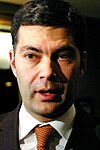Quebec general election, 2003
|
|
|||||||||||||||||||||||||||||||||||||||||||||||||
|---|---|---|---|---|---|---|---|---|---|---|---|---|---|---|---|---|---|---|---|---|---|---|---|---|---|---|---|---|---|---|---|---|---|---|---|---|---|---|---|---|---|---|---|---|---|---|---|---|---|
|
|||||||||||||||||||||||||||||||||||||||||||||||||
|
|
|||||||||||||||||||||||||||||||||||||||||||||||||
|
125 seats in the 37th National Assembly of Quebec 63 seats were needed for a majority |
|||||||||||||||||||||||||||||||||||||||||||||||||
| Turnout | 70.42% | ||||||||||||||||||||||||||||||||||||||||||||||||
|
|||||||||||||||||||||||||||||||||||||||||||||||||

Map of Quebec's ridings coloured in to indicate ridings won by each party and their popular vote. PLQ (red): 76 seats; PQ (cyan): 45 seats; ADQ (blue): 4 seats.
|
|||||||||||||||||||||||||||||||||||||||||||||||||
|
|||||||||||||||||||||||||||||||||||||||||||||||||
The Quebec general election of 2003 was held on April 14, 2003, to elect members of the National Assembly of Quebec (Canada). The Parti libéral du Québec (PLQ), led by Jean Charest, defeated the incumbent Parti Québécois, led by Bernard Landry.
In Champlain there was a tie between PQ candidate Noëlla Champagne and Liberal candidate Pierre-A. Brouillette; although the initial tally was 11,867 to 11,859, a judicial recount produced a tally of 11,852 each. A new election was held on May 20 and was won by Champagne by a margin of 642 votes.
In 2002, the Parti Québécois (PQ) government had been in power for two mandates. It was seen as worn-out by some, and its poll numbers fell sharply. It placed third at its lowest point. An important part of its support was going to the Action Démocratique du Québec (ADQ) and its young leader, Mario Dumont. Some PQ supporters had left for the Liberal party.
Landry, leader of the PQ, undertook a revitalization of the party and its image. As the ideas of the conservative nature of ADQ's platform became more apparent, that party's popularity declined. Social democratic measures taken by the PQ government, like the passing of the "Law against poverty" helped improve the PQ's standing in the public opinion polls. PLQ leader Jean Charest initially continued to be unpopular with voters.
The 2003 election happened against the backdrop of the war in Iraq. The battles of that war took place during the first half of the campaign, diverting the attention of the media and the population. Landry became known for his custom of wearing the white ribbon (which in 2003 was worn by people in favour of peace). This custom was shortly followed by the two other main party leaders, Charest and Dumont. Landry was the most outspoken critic of the war. The other two were more discreet on the matter. Charest once stated that it was an opportunity to reaffirm his "belief in peace". Dumont acted in a similar way, while also addressing criticism to Landry, saying that Quebecers should refrain from criticizing Americans too harshly since Americans were historical friends of Quebecers.
...
Wikipedia



